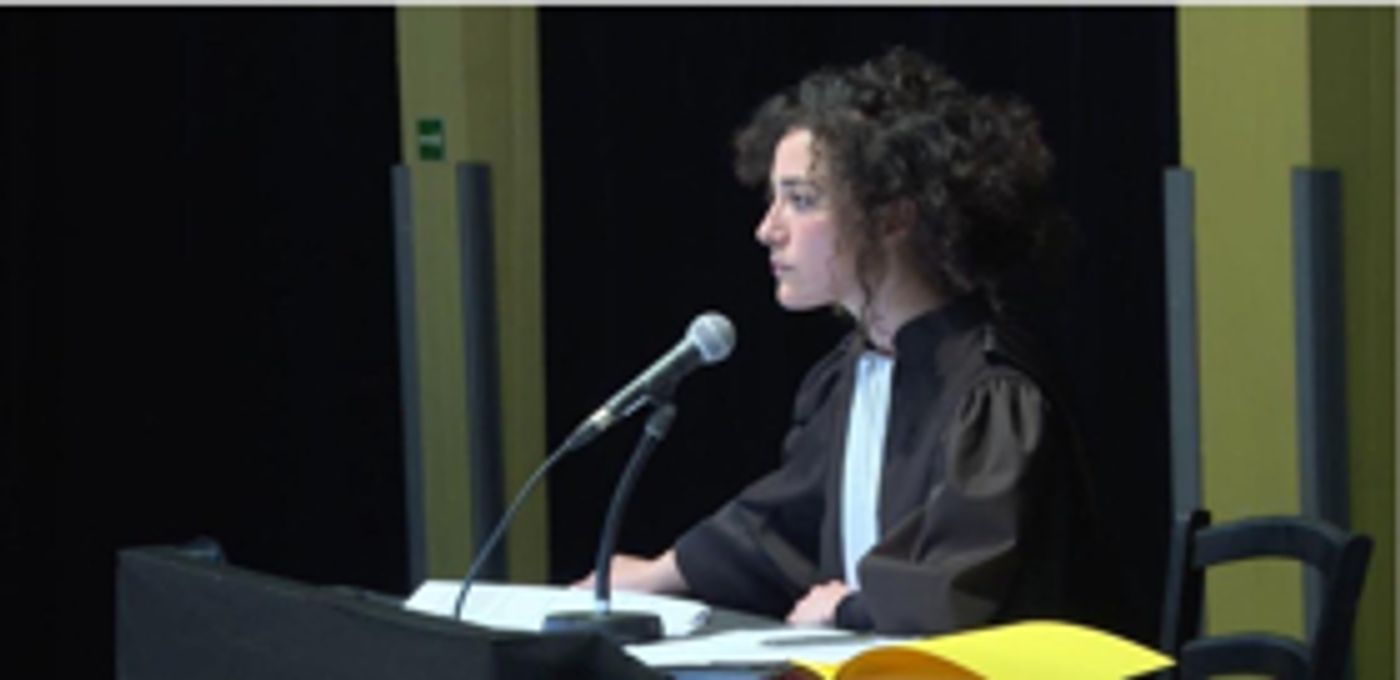Review: AVIGNON THEATRE FESTIVAL Presents MEDUSE By LES BÂTARDS DORES

As my time attending performances in the Avignon Festival's "In" comes to a close there are certain consistencies that float to the surface. Among these are nudity, bodily fluids, video integration, and a spectacular quality of sound design. Les Bâtard Doré's Méduse, now in performance in the Avignon Theatre Festival's Gymanse du Lycée St Joseph, has a bit, or a lot, of each. However, even in as such lofty company as the Avignon Theatre Festival, Lény Bernay's soundscape is transporting. Translating mental anguish, the sea, and dizzying poetry in a heart rumbling bass his presence is a boon to Les Bâtards Dorés extremely promising production.
The audience enters choosing their seat on either side of a large white canvas runway. At one far end of the canvas is an elevated judge's lectern, at the other Jean-Michel Charpentier paints a landscape of grizzly and forlorn faces. "All rise" is heard as the president, performed by Lisa Hours, enters in her judge's robes. We are gathered, so it appears, for a post-mortum regarding the raft of the medusa. Made famous by the Géricault painting, this infamous raft is the result of the Méduse frigate shipwreck, which occurred off the coast of Africa in 1816. Of the 151 who took refuge on the raft, only 15 survived. Included in the survivors is a doctor who has shown up to give testimony. In the middle of his apologia a fellow survivor stands among the audience and contradicts his testimony. The judge tries to create order as the doctor is accused of killing a woman, the other survivor's wife. Balancing her curiosity and intention to maintain order the judge turns the question to nutrition. "You ate?" Both men have a look of disbelief. "Yes, we ate." They then disagree. "Cooked" "Raw" "Cooked" "Raw" "Cooked/Raw" "Raw/Cooked "Raw/Cooked" "Raw/Raw" "..." With that the judge throws raw meat on the runway, which we learn is the same dimension of the medusa raft, and the two men begin to stuff their faces as the stage goes dark.
In dark the court bailiff asks if he may do his poem. The actor Jules Sagot shelves his caricature and jumps into a neon lit slam poetry session. After this spin into the contemporary we are brought to la Méduse. The actors present a shocking, riveting, and spinning presentation of the deepest depths of delirium. Perfectly mixing the colonialist reflexes of the time, the grotesque limits of desperation, and physical extremes, the Romance of their circumstances as depicted by Géricault is utterly shattered. Where in the Géricault painting we hear a Tchaikovsky symphony reach a triumphant crescendo, here Bernay has a psychotic rumble beneath our feet and a suffocating bass, which blurs thought. After witnessing the previously discussed crime we return to the court where a small group of audience members are asked to give a cold ruling regarding the doctor's guilt.
There is urgency and bravery to this work. What might be missing from the examination of this crime is the victim. Lost in the shuffle of extraordinary circumstances, the death of a human is not integrated into the criminal stakes. A murder was discussed, but a death of a human, however grotesque, lacked tragedy. This stacks the deck in the surgeons favor, even if the juridical questions lack even the hint of mercy. However, these critical points are vague concerns in the face of such a work of passion.
All actors on stage selflessly throw themselves into a world of impossible distress. As the surgeon, Manuel Severi perfectly undermines the supposed dignity of his uniformed officer. Jules Sagot's impassioned madness and equally impassioned poetry is striking. As the judge and then the mad victim, Lisa Hours is a perfect specimen of dignified control and then desperate loss. Lastly, Romain Grard presents the fury of masculinity stripped to its passions. Lights by Lucien Valle are effective and costumes by Delphine Desnus perfectly get the point across. Méduse is a raw-raw examination of the frontier of human circumstances, and the limits of our social systems to digest them.
Image: Screenshot from CultureboxReader Reviews
Videos


